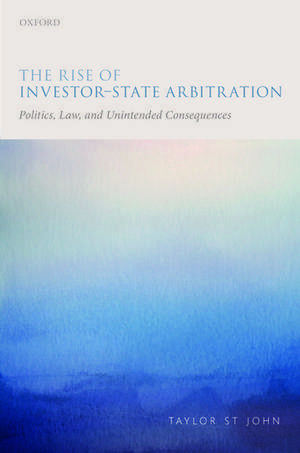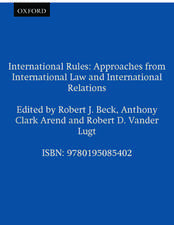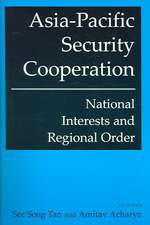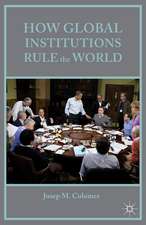The Rise of Investor-State Arbitration: Politics, Law, and Unintended Consequences
Autor Taylor St Johnen Limba Engleză Hardback – 7 mar 2018
Preț: 564.98 lei
Preț vechi: 749.30 lei
-25% Nou
Puncte Express: 847
Preț estimativ în valută:
108.11€ • 111.70$ • 89.94£
108.11€ • 111.70$ • 89.94£
Carte tipărită la comandă
Livrare economică 08-14 martie
Preluare comenzi: 021 569.72.76
Specificații
ISBN-13: 9780198789918
ISBN-10: 0198789912
Pagini: 300
Dimensiuni: 164 x 242 x 26 mm
Greutate: 0.61 kg
Editura: OUP OXFORD
Colecția OUP Oxford
Locul publicării:Oxford, United Kingdom
ISBN-10: 0198789912
Pagini: 300
Dimensiuni: 164 x 242 x 26 mm
Greutate: 0.61 kg
Editura: OUP OXFORD
Colecția OUP Oxford
Locul publicării:Oxford, United Kingdom
Recenzii
Taylor St John's book of course is also what I would call a necessary read for anyone lacking my fascination for archives but who is still involved in the investor-state arbitration field from a policy-related perspective...Perhaps the most important lesson from the invaluable research and fascinating account by Taylor St John is that we should all be careful to accept arguments or opinions at face value. In short, we all need to do our homework...So thank you Taylor St John for opening the doors to the archives, and for making us better equipped to join the conversation for the future.
How can we explain one of the most puzzling and controversial international law regimes of our time: investor-state dispute settlement? Based on painstaking archival research and interviews, St John goes beyond the narrative that capital importing countries, pushed by corporate greed and investor lobbying, signed on to investment treaties without knowing what they got into. Instead, she demonstrates that well-meaning international bureaucrats, at the World Bank, were largely behind the emergence of this exceptional regime with, also for them, unintended consequences. The book offers a captivating story of how international institutions matter and how innocent, incremental steps can create a path dependent Frankenstein that may be difficult to control or reform.
Investment treaties are under fire - in Brussels, in Washington, and around the world. As billionaire investors use ISDS to extract millions from governments, critics describe the process as toxic and embodying runaway globalization. Taylor St John offers a lively and balanced account of how ISDS came into being. Drawing on thousands of original documents, and dozens of interviews, she takes us inside ISDSs founding moments, revealing that this was not a hyper-globalizers conspiracy.
The world has, in recent years, woken up to Investor-State Dispute Settlement, which is viewed by many as a corporate assault on the sovereign rights of developed and developing countries alike. In her fascinating and meticulous book, Taylor St. John unearths the origins of ISDS, showing how a group of idealistic mid-twentieth century international civil servants planted the seeds of a system that would over time draw in national governments, international investors, and lawyers into the controversial practice we know today. St. John's book employs both cutting-edge international relations theory and painstaking archival research to illuminate how the world came, incrementally and unexpectedly, to adopt a system that is both deeply entrenched and widely reviled.
How can we explain one of the most puzzling and controversial international law regimes of our time: investor-state dispute settlement? Based on painstaking archival research and interviews, St John goes beyond the narrative that capital importing countries, pushed by corporate greed and investor lobbying, signed on to investment treaties without knowing what they got into. Instead, she demonstrates that well-meaning international bureaucrats, at the World Bank, were largely behind the emergence of this exceptional regime with, also for them, unintended consequences. The book offers a captivating story of how international institutions matter and how innocent, incremental steps can create a path dependent Frankenstein that may be difficult to control or reform.
Investment treaties are under fire - in Brussels, in Washington, and around the world. As billionaire investors use ISDS to extract millions from governments, critics describe the process as toxic and embodying runaway globalization. Taylor St John offers a lively and balanced account of how ISDS came into being. Drawing on thousands of original documents, and dozens of interviews, she takes us inside ISDSs founding moments, revealing that this was not a hyper-globalizers conspiracy.
The world has, in recent years, woken up to Investor-State Dispute Settlement, which is viewed by many as a corporate assault on the sovereign rights of developed and developing countries alike. In her fascinating and meticulous book, Taylor St. John unearths the origins of ISDS, showing how a group of idealistic mid-twentieth century international civil servants planted the seeds of a system that would over time draw in national governments, international investors, and lawyers into the controversial practice we know today. St. John's book employs both cutting-edge international relations theory and painstaking archival research to illuminate how the world came, incrementally and unexpectedly, to adopt a system that is both deeply entrenched and widely reviled.
Notă biografică
Taylor St John is a Postdoctoral Research Fellow, PluriCourts, University of Oslo, and Senior Research Associate, Global Economic Governance Programme, University of Oxford.















